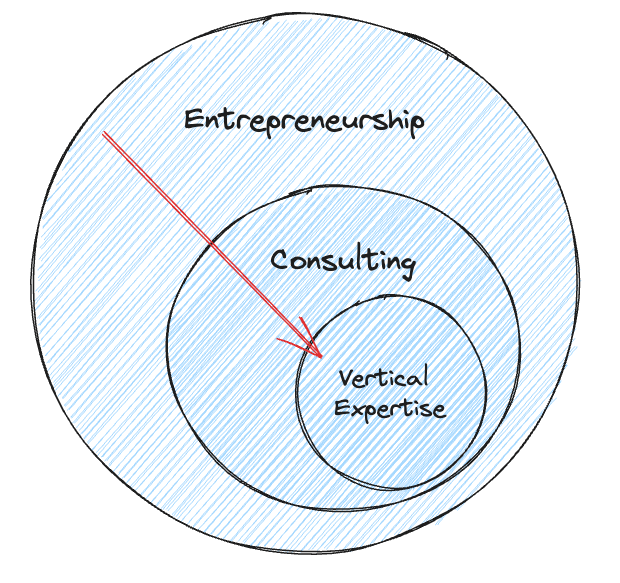A 3-Year Roadmap For Starting a Consultancy
Which year are you in?
📣 Announcements
I’m offering a 10% referral bonus (up to $1,000) if you refer someone who needs a SaaS product built to All-In Consulting.
Have them mention your name, and I’ll reach out when the deal closes.
My first year of entrepreneurship felt like running around with my pants on fire.
I was constantly on the move, but it wasn’t clear where exactly I was running to.
As my second year comes to a close, one of the biggest wins I had this year was greater clarity on what I should be working towards.
And I’ve finally figured out what the multi-year roadmap for building an early-stage consultancy looks like.
Having this bigger picture in mind helped me better prioritize my goals, and figure out whether I was moving in the right direction or not.
It helped assuage any anxiety I had during slower periods as I could prove that I was still making progress, and it helped me determine what my focus each quarter should be.
In today’s article, I’ll map out what the 3-year roadmap for starting a consultancy looks like, and how this informs the growth strategy for your consultancy.
Understanding the 3-Year Timeline for Independent Consulting
Starting a consultancy is a 3-year journey. Each year has a specific theme, with 2-3 success criteria.
So long as all your actions are consistent with that year’s theme, and you’re able to complete the success criteria for each year, you should feel confident that you’re making significant progress.
The 3-year roadmap looks like this:
Year 1: Experimentation
In your first year, the theme is experimentation. And as such, your goals are to 1) develop fundamental entrepreneurship skills and 2) decide which entrepreneurship option you want to double down on.
Committing to entrepreneurship is a career change. And as with any career change, it will take time to develop the fundamental skills in that career before you’re able to advance further.
I would treat year 1 as a building year where you develop fundamental entrepreneurship skills, including:
Not being afraid of self-promotion
Not being afraid to make asks
Fast execution
Consistency
Content creation
Fast decision-making
I would also treat this year as your opportunity to try many different entrepreneurship options out. This includes coaching, consulting, community-building, freelancing, courses, product-building and more.
Each of these options could be a full-time job if you commit fully to it, so your goal for year 1 is to choose which of these options you want to double down on.
As a personal example, it was during my first year of experimentation that it became obvious that consulting had more traction than anything else I did.
So consulting became the natural focus for me at the beginning of 2023.
I suspect that your trajectory will be very similar, where you will be naturally drawn to one option over all the others after a year of experimentation.
That’s what you want to double down on in year 2.
At the end of this year, if you have tried many experiments, have clarity on which entrepreneurship path you want to focus in on, and developed general entrepreneurship skills, I would consider this year a success.
Year 2: Foundation
As you enter your second year, you have mastered general entrepreneurship skills, and know that consulting is what you want to focus on.
Your goal now is to develop general consulting skills, and choose a specific domain to focus your consulting expertise in.
The general consulting skills all consulting founders must have include:
Knowing how to price projects
Understanding the balance sheets for consultancies
Knowing all the key metrics you should target for your consultancy (gross margins, growth rate, etc)
How to hire and build teams
What the sales funnel looks like for your consulting domain
How to manage client expectations
How to successfully deliver on projects
How to write proposals
How to write case studies
How to qualify leads
Fundamentals of positioning, differentiators, and solutions offerings
How to build a lead generation plan
By the end of this year, you will have also completed several engagements, have clients in a broad range of industries, and have a better idea of which clients you want to focus on.
That’s when you’ll know what your focus area in your consultancy should be in year 3.
By the end of this year, you should also have a lead generation plan ready for how you will find more of these ideal clients. That way going into year 3, your job will be focused mostly on implementing this growth plan.
Year 3: Focus
By year 3, you are a consistent entrepreneur, you have overseen several consulting projects end-to-end, and have now chosen a consulting specialization.
Your goal is to now go all-in on this specialization and develop deeper expertise for the industry you’re choosing to focus on.
So a successful year 3 would look like this:
Your client base is primarily in your target industry by the end of this year
You have implemented the lead generation plan from year 2, and doubled down and optimized the most successful ones by the end of this year
You have significant industry insight, expertise and authority developed in your field
At this point, your lead generation is scalable, and delivery is automatic. You’re able to confidently forecast your finances.
Your priorities in years 4 and onward is to scale leadership, potentially even hiring a general manager or CEO to run the day-to-day for you, and position yourself for an acquisition in years 5-7.
What This Means For You
So we’ve discussed the 3-year timeline for starting a consultancy and your main focus areas for each year.
Here’s how this will dictate your priorities as you grow your consultancy.
Takeaway 1: Know your positioning in the timeline
There are levels to this consulting game. You have to make sure you know which level you are on right now and check off all the boxes at your current level before advancing to the next one.
For example, many people are interested in starting a consultancy right off the bat and try to learn the general consulting skills in year 2 before mastering the general entrepreneurship skills first.
Without that foundation, their growth will plateau quickly until they learn the skills from the earlier level first.
For example, if they aren’t able to make asks, how would they ever develop a referral business?
If they aren’t able to develop fast execution skills, how would they implement a lead generation channel quickly?
So some questions for you to ponder are:
Which year in this 3-year timeline are you in right now?
Have you checked all the boxes from the previous years already?
If you have completed all the boxes, feel free to move on to the next stage. If not, it may be worth investing some time in developing those skills before learning any consulting specific skills.
Takeaway 2: Make consistent content creation a goal in year 1
If you don’t know what experiments to try in year 1, consistently producing content on a set schedule is a great way to start.
Content creation is like a mini-university in entrepreneurship. Each piece of content is like a product, so content creation teaches you how to execute quickly and bring a product (your content) to the market as quickly as possible.
It’s also a pre-requisite for consulting because a large part of consulting is writing.
You’re constantly writing proposals, sending client emails, communicating with your team, and writing case studies. So you’ll need these skills as you build your consultancy anyways.
Content creation is so important now that I consider it a foundational entrepreneurship skill.
Takeaway 3: Setting income goals is not productive early on
Lastly, I really encourage you to not set income goals for yourself in your first two years of starting a consultancy.
Instead, treat attaining all the skills in years 1, 2, and 3 as your success criteria instead.
I see a lot of new independent consultants say they want to quit and try to make X amount of money by the end of the year. And invariably they get discouraged if they don’t hit those goals.
The problem with income goals is that anyone can make up a number and set it as a goal. But it doesn’t give you any direction on how to achieve that goal.
Skills collection is a more concrete goal to strive towards.
Income is also a lagging indicator of your own personal growth. The income will not catch up until your skills catch up as well.
So focus less on the income you’re making, and make sure to check off all the pre-requisite skills I mentioned above instead.
I promise the income will catch up eventually!
Final Thoughts
Understanding the 3-year timeline for starting a consultancy will give you clarity on what to focus on each year.
By focusing year 1 on experimentation, year 2 on foundational consulting skills and year 3 on focused expertise, you will be well on your way to building your dream consultancy.
Whenever you're ready, there are 2 ways I can help you:
“Beginner’s Guide to Medium in 75 minutes” - where I break down my entire writing process and show you how to grow your Medium following.
“How to Be an Engineer Influencer” - where I teach W-2 employees how to diversify their income streams by building an audience on social media.
Connect with me on social media here.








great post! I love this simple framework. as a year 1-er, its a good reminder that where I'm at is where I'm supposed to be :)
Incredible content, Michael